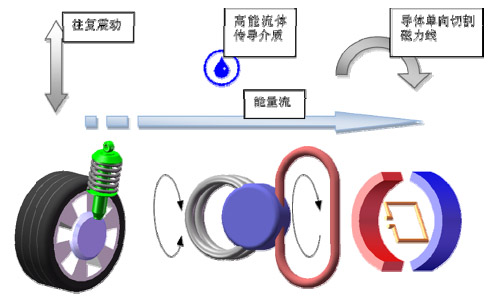Peking University, Nov. 30, 2010: Hate the chaotic hustle of job fairs, and after that, being bossed around like a busboy? Some adventurous college students want to turn the tables and cash in on their innovations.
Student groups cherry-picked from over 40 Chinese colleges faced down each other on Sunday at the run-off of the China University Technology Entrepreneurship Competition (UTEC) at Peking University, painstakingly showing off their gadgets and eagerly vying for the attentions of the venture capitalists sitting in the front row.

An illustration shows how the bumper ShockEner would work. [Provided to chinadaily.com.cn]
The contestants' enterprising ambition, some aggressively, stands out as a stark contrast to the drone of most Chinese college graduates who dutifully hew to the convention of job hunting. However, the market is not so rosy, and about 30 percent of college students can't find an offer before moving off campus. China's top labor official Yin Weimin said last week that the country will face a tough job market in the next five years and the government will, among other measures, try to encourage people to start their own businesses.
At Sunday's contest, the college students laid out their dazzlingly sundry proposals to jump-start an entrepreneurship, from amicable gadgets like air purifier, intelligent crutch and solar-powered smart phone, to outright perplexing technologies like fluidized denitrator filtering equipment and manure byproducts via biogas fermentation, whose names alone are formidable enough for a layman.
Equally mind-blowing is the unabashed self-importance assumed by those rookie entrepreneurs who introduced themselves by, first and foremost, the fancy C-suite titles of their nascent unknown companies. At moments, the stage seemed like a fair market rather than a campus contest.
Liu Cheng, a graduate student from Peking University, flashed away a special bumper named ShockEner which converts vehicle vibrations into electricity, which he said could harvest and save energy equivalent to 3 to 5 percent of fuel consumption. The bumper is a co-production by Peking University and Beijing Institute of Aeronautics.
"Think about it, if every car running in China is equipped with our bumper, that would be about 100 million units, what would it be like? Think about it," an excited Liu paced on the stage, lining out the development plan of his six-month-old company, of which he is the CEO.
"What we lack is money," Liu didn't bother to mince words.
Liu's team won the third prize on Sunday. According to the organizer, further contacts between prize-winning teams and venture capitalists will be planned.
Reported by: Zuo Likun
Source: Chinadaily.com.cn